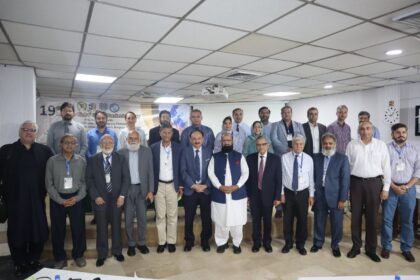Pir Mehr Ali Shah Arid Agriculture University Rawalpindi (PMAS-AAUR), in partnership with the Climate Hub Forum (CHF), hosted a high-level policy dialogue addressing climate justice and the role of nature-based solutions in driving global impact. The event brought together international legal, academic, and policy experts to discuss how recent developments, including the International Court of Justice’s advisory opinion on states’ responsibilities in preventing climate harm, can shape future actions for a more equitable and resilient climate response.
The session opened with remarks from Ms. Erum Khan, Founder of CHF and UN NGL Fellow, who emphasized the importance of ensuring that Loss and Damage funds are delivered to those most affected by climate change, rather than remaining stuck as unfulfilled pledges. She advocated for climate finance that is fair, accessible, and free from the burden of debt for developing nations. Ms. Khan also announced the establishment of a Climate Justice & Regenerative Systems Commission, which will advance the dialogue’s outcomes into upcoming international climate negotiations, including COP30.
Prof. Dr. Rahmatullah Qureshi, Dean of Sciences at PMAS-AAUR, presented the university’s achievements in climate-resilient agriculture, mangrove restoration, and the integration of nature-based solutions into academic programs. He shared a video outlining the Faculty of Sciences’ efforts, which include hosting international conferences on climate change, food security, and the use of medicinal plants.
Participants highlighted the strengthening effect that the ICJ’s ruling has on global commitments to binding climate action and the increasing significance of nature-based solutions for restoration efforts. The event concluded with five strategic priorities: enhancing Global South leadership in Loss and Damage finance, integrating research and policy through collaboration with PMAS-AAUR, and developing new pathways to empower youth, institutions, and innovative financing mechanisms for building climate resilience.











